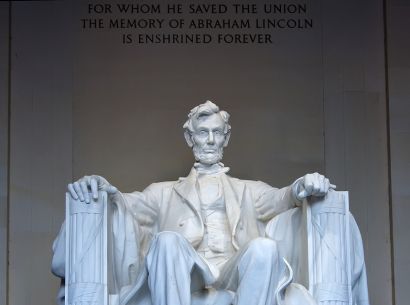This Week's Story
Lincoln had grit for the enormity of challenges he attacked: How important was it that the United States be one nation? What is the morality of slavery? How does slavery affect economy?

This Week’s Story relives American history and the Bible through brief inspiring stories presented on mp3 audio recordings and text for reading.
Abraham Lincoln Outruns A.I. and Flesh and Blood Analysis! part three
“Barbara, your title for this series on Abraham Lincoln is uncommon. I suspect you had several reasons for it.”
“I did. Did it make sense to you?”
“I think so. I know that the word outruns suggests a winner. Abraham was a winner of foot races as a teenager. As an adult he ran in several political races. He won several and lost some.
“He ran the race for legislator in the Illinois State Legislature once and lost. Four other times he won and served eight years. He became speaker pro tempore of the Illinois State Legislature. He served in the United States House of Representatives for one term. He ran for being a United States senator and lost. Twice he ran for president of the United States and was elected.”
“Several Union political parties and people were competitors in Abraham Lincoln’s second race for the U.S. Presidency. Most of the Union soldiers voted for President Lincoln. They were an important bloc of voters.
“The final outcome was that Lincoln won 212 electoral votes and George B. McClellan won 21 electoral votes. Lincoln won 2,213,665 of the popular votes; McClellan won 1,805, 237 of the popular votes. Lincoln was the clear winner.”
“During Lincoln’s many political races he commented, ‘I am not bound to win, but I am bound to be true. I am not bound to succeed, but I am bound to live up to what light I have.’”
“These were years of intense debates and learning political processes in a republic, such as the United States. What did it mean to participate in a country in which the leaders of the country are elected by the citizens? How can the elected leaders be representatives of the people? The people are to be the ultimate authority. There is no king or queen; nor is there to be a ruling elite over the people.”
“Lincoln was not an extremist. He had a moderate position on slavery. He initially was not trying to stop slavery in slave states, but he did not want it to spread to new territories or states! He had long support for economic issues, western origins, and strong oratorical skills. These positions and skills were exactly what the Republicans wanted in a president!
“Lincoln needed definite positions on the effects of slavery on economy and the morality of slavery. The other core issue was states’ rights. How important was it that the United States be one nation? How could it keep a united vision for being one nation under God, as now stated in the Pledge of Allegiance?”
“Lincoln had enormous grit for the enormity of challenges he attacked. He hugely impacted United States history. He needed practical intelligences to help factions develop a common vision in the United States. Then the people could share and have an on-going voice in shaping the nation.”
“Currently we need to get past believing: ‘You are either with me or against me.’ We have issues which are prominent in the United States, confusing, and often with new terms.”
Investigate thisweeksstory.com. An ongoing opportunity!
<< previous story] [next story >>
We invite your comments! [click here to comment]
This Week's Story is a non-profit supported by listeners. [click here to make a donation]
 click here to play audio
click here to play audio